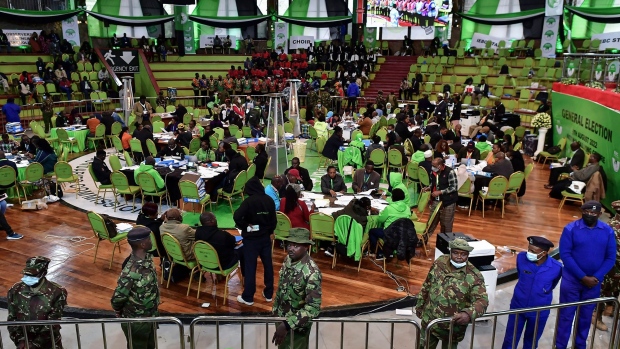Aug 15, 2022
Kenyan Electoral Agency Prepares to Announce Final Vote Results
, Bloomberg News

(Bloomberg) -- William Ruto was declared the winner of Kenya’s presidential election by a razor-thin margin after seeing off a challenge from five-time contender Raila Odinga, whose campaign officials and supporters rejected the official results.
Ruto, 55, garnered 50.5% or 7.1 million of the valid votes cast on Aug. 9, and his main rival Odinga 48.9%, the Independent Electoral and Boundaries Commission said at a ceremony in the capital Nairobi, on Monday. Ruto has pledged to rein in debt, spend 500 billion shillings ($4.1 billion) to support entrepreneurs and farmers, create jobs for millions of unemployed youths and give half the posts in his cabinet to women.
Chaos erupted shortly before the results announcement, as four of the nation’s seven electoral commissioners rejected the outcome. A short while later, gunshots rang out as Odinga supporters stormed the podium where the IEBC officials were gathered, and denounced the counting and verification process. Their rejection of Ruto’s victory bodes ill for political stability in East Africa’s largest economy, where previous disputed votes were marred by violence.
“We cannot take ownership of the results that are being announced because of the opaque nature with which the results have been handled,” IEBC Vice Chairwoman Juliana Whonge Cherera told a televised briefing at a separate venue.
Intimidation, Harassment
Wafula Chebukati, the IEBC’s chairman, said he stood by the results despite being subjected to intimidation and harassment. “I’ve done my duty according to the constitution,” he said after the security forces restored order.
Foreign diplomats left the center because of security concerns, said two people who asked not to be identified because they’re not authorized to speak to the media.
Kenya’s 2024 Eurobonds extended losses, with the yield rising 345 basis points to 15.754% by 6:33 p.m. in Nairobi.
Ruto struck a conciliatory tone in a speech after being declared the winner.
‘Close Ranks’
“I know many are wondering, especially those who have done many things against us, I want to tell them, there’s nothing to fear. There’s no room for vengeance,” Ruto said. “We don’t have the luxury to apportion blame. We must close ranks and work together for a prosperous, functioning Kenya.”
Ruto’s running mate was Rigathi Gachagua, a lawmaker from central Kenya, who will become deputy president. Odinga’s campaign was backed by incumbent leader Uhuru Kenyatta, who is stepping down after serving the maximum two terms. Opinion polls conducted in the lead-up to the vote showed the 77-year-old former prime minister had a slight edge in the race.
The election was held against the backdrop of soaring living costs and a crippling drought. Public debt totaled 8.56 trillion shillings by the end of May -- servicing it is projected to eat up more than half of the state revenue, and the International Monetary Fund has warned the nation is at high risk of debt distress. Ruto has ruled out restructuring the debt, an option favored by his rival.
Odinga has yet to react to the results, although some of his campaign officials said they rejected the outcome. If he decides to challenge them, he has to petition the Supreme Court within seven days and it must consider his objections and make a final ruling on their validity within 14 days. Should the results be nullified, as they were in 2017, fresh elections must be held within 60 days of the ruling. Ruto will be sworn in later this month if there is no court petition.
Lawsuit Expected
“Expect a lot of controversy. Expect a court case,” Nic Cheeseman, professor of democracy at the University of Birmingham, said on his Twitter account. “Expect this to run and run.”
A self-described “hustler,” Ruto says he started out in business by selling live chickens on a roadside, went on to own one of the country’s biggest poultry farms and expanded into hospitality and real estate. He entered politics in his 20s, securing a parliamentary seat in 1997.
Ruto and Kenyatta were on opposing sides in a disputed 2007 vote that triggered ethnic fighting and the International Criminal Court charged them with crimes against humanity. Both men denied wrongdoing and the cases were eventually dropped due to a lack of evidence.
Ruto then backed Kenyatta in the 2013 and 2017 elections on the understanding there would be a quid pro quo after the incumbent stepped down. But the two fell out in 2018 after Kenyatta reconciled with Odinga after a long-running feud.
“International concerns about violent electoral clashes have proved unwarranted so far, but social tensions are historically at their peak when the winner is announced,” risk consulting firm Verisk Maplecroft said in emailed comments. “Ruto’s refusal to agree to restructure Kenya’s debt during the campaign means his victory will boost investor confidence in one of Africa’s largest economies. Ruto has publicly promised to restrict spending to within existing budgetary limits, which will ease the building macroeconomic concerns.”
(Updates with analyst comment in first paragraph after Lawsuit Expected subheadline.)
©2022 Bloomberg L.P.






